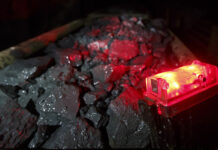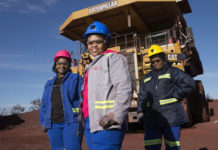
[miningmx.com] — DEBENTURES in mining group Sallies – which halted operations at its Witkop fluorspar mine last week – are yielding a noteworthy 19%.
That’s n-n-n-n-n-n-n-nineteen, like that old eighties hit song about the average age of American combat soldier in the Vietnam war.
This is an attractive pre-tax yield in anyone’s books – albeit entailing an investment in a junior miner that has, at best, stuttered along over the last five years.
But the folly of chasing fanciful investments offering extraordinary short-term returns has been dramatically reinforced in recent months, both here and abroad.
With the mantra “if it looks to good to be true then be wary” still reverberating around world markets, Sallies Debentures certainly offers investors a position that might best be described as “dangerously attractive”.
Personally, I have had more painful flirtations with Sallies over the years than I’d like to remember. As a compromise I have settled on a rather tempestuous longer-term affair with Sallies debentures, which I reckoned would at least offer a yield with which to grease my creaky small cap portfolio (don’t even ask!).
The situation with Sallies debentures really revolves around bi-annual payments of 2.5c/debenture due in July and January.
The debentures were originally issued in a rights issue at 50c/debenture, representing an initial yield of 10%. Sallies debentures – largely following the pattern of the Sallies ordinary shares – have slumped to about 26c on the JSE. That means a yield of over 19%.
But how long can Sallies afford to service debentures if its flagship mine Witkop is shut down?
An official press release from Sallies stresses that since the Witkop mine has produced enough fluorspar to honour contracts until the end of this year, “there appears to be no other viable option but for production to be suspended with immediate effect in order to conserve cash.”
No indication is given as to how long management envisages the shutdown will last. But in present economic conditions, it would be impossible to say with certainty whether a shutdown will last six months or a year.
Okay, so the idea – and I hope this does not sound too insensitive – is that Sallies will cull the major operating expense by retrenching workers at Witkop. I presume that activities at the mine, until operations resume, will revolve mainly around care and maintenance.
But the market (and now with the rand strengthening again) certainly does not sound too encouraging. Sallies CEO Tom Dale says many international acid grade fluorspar consumers have been de-stocking since late 2008.
He says since current production by these consumers is a “fraction” of what it was before October 2008, there are sufficient fluorspar stocks to continue operations.
Ominously, Dale notes: “As a result, new demand for acid grade fluorspar has collapsed and despite concerted efforts by management and its marketing agent, Witkop has been unable to secure future orders.”
Scary stuff
The fall in demand is so pronounced that Sallies ruled out the less traumatic option of scaling back production.
This is scary stuff, and Sallies debenture holders will be very keen to scrutinise the company’s second-half trading performance ending June 30.
At the interim stage, Sallies boasted encouraging operational cash flows of R6.5m. But net cash flow was negative to the tune of R13m after substantial investments in operations.
The cash flow statement showed cash on hand of just R12.5m – which really means that the roughly R70m in new capital raised by the issue of debentures in 2008 has mostly been wiped out.
Sallies debenture holders will be praying that the company finished the second-half trading period with positive cash flows. Aside from servicing the debentures, Sallies also has to fork out compensation of about R10m to former customer Honeywell International.
The servicing of its debentures in July will cost Sallies about R3.7m. Some punters may conclude that if Sallies has not produced meaningful operational cash flows in second-half trading, there is not going to be too many rands left in the bank account.
Sallies, though, held about R43m in inventory at the end of December 2008. Quite possibly inventory levels will have topped R60m at the end of June.
Assuming Sallies can move its remaining fluorspar stocks (in other words, if customers honour their existing orders) the first half of the 2010 financial year should – considering the much reduced operating costs – see a good dollop of sales drop down to bottom line. More so if the rand weakens and global economies start stirring…
Would I then be amiss (or hopelessly optimistic) to suggest that Sallies has potential net cash levels of close to R50m on hand? That would be enough to preclude any morbid thoughts about defaulting on debenture interest for the foreseeable future.
Perhaps that’s why the price of Sallies debentures is still holding in a speculative range between 26c to 29c on the JSE, while ordinary shares dipped a rather nasty 12% on Monday.
Naturally, what happens with Sallies in the medium term really depends on world markets recovering convincingly.
If the world economic recovery drags on, the best that can be hoped for is that Sallies is able to cap Witkop’s mothballing costs around R5m, and that monthly “care and maintenance” costs are kept under R1m.
I would also hope Sallies can re-start operations quickly if fluorspar demand (touch wood) picks up – meaning two to three months run-up to full production rather than five to six months.
What I do find fascinating, though, is that Sallies management still sees a bigger picture through the prevailing gloom. Management claims to be “actively pursuing opportunities for corporate activity precipitated by the world recession”.
Mulling with Metorex?
After the costly acquisition of the Buffalo mine (mothballed late last year), I certainly hope Sallies makes doubly sure it is buying or merging with a real low cost fluorspar producer.
Perhaps Sallies is mulling something with Metorex’s fluorspar mine, Vergenoeg?
Key to any corporate action will be New York-based emerging markets investment firm Firebird Management, which holds 19% of Sallies’ ordinary shares and 19% of the debentures.
Fin24.com has previously speculated that Firebird – which also owns strategic stakes in Maghreb Minerals (an AIM-listed mining company with fluorspar rights in Tunisia) as well as Mongolian fluorspar interest – could initiate corporate action at Sallies.
At this stage of the commodity cycle, it may well suit Firebird to hold its fluorspar interests under a single listed entity.
For an increasingly nervous Sallies debenture holder, consolidation involving Sallies may well be a sweet bird of redemption.
*Hasenfuss holds Sallies debentures.











